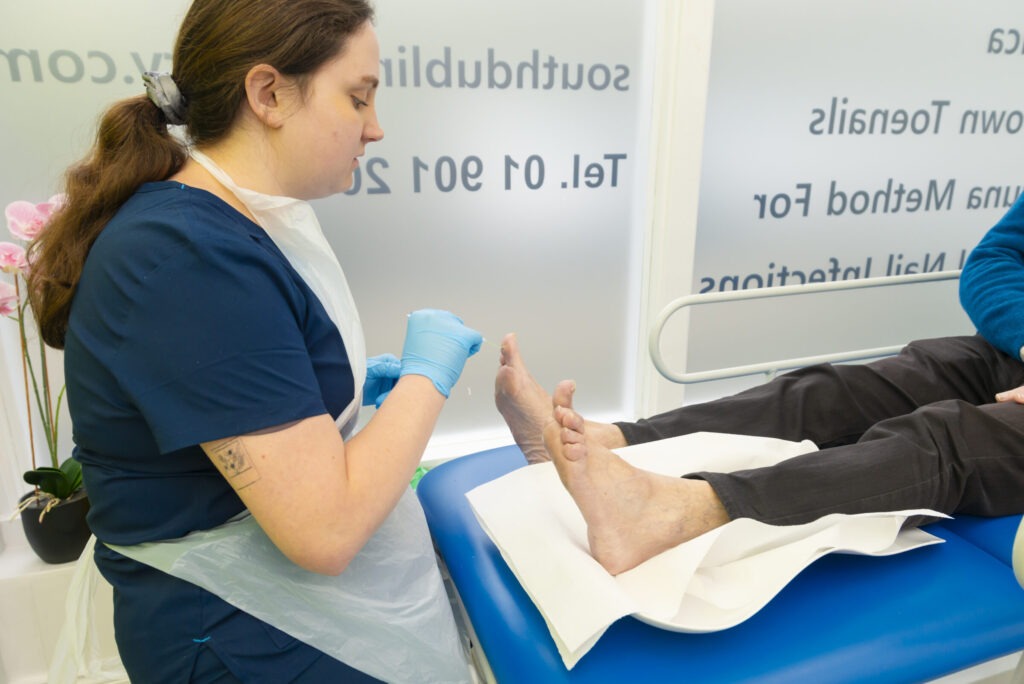
At South Dublin Podiatry, we understand that maintaining good foot health is vital for anyone living with diabetes. Regular foot assessments are crucial to catch problems early, preventing serious complications and even limb loss.
Our team of specialist podiatrists is here to guide you in managing your foot health, including checking the fit of your shoes—did you know that around 76% of people wear shoes that are the wrong size? We also perform detailed assessments of your circulation and nerve supply to ensure everything is functioning properly.
Diabetes can impact your circulation and nerves, making regular foot care and monitoring essential. Our goal is to develop a personalised foot care plan that’s right for you, keeping you active and comfortable.

Our feet contain thousands of nerve endings which look after touch, pain, pressure, temperature (plus, many more) and have 2 main arteries (Tibialis Posterior and Dorsalis Pedis) that branch off into numerous other smaller vessels. This is the same for everyone, which is why all our patients can benefit from a full neurological and vascular assessment.
Everyone should have one at least every 1-2 years, however, if you have Diabetes, Cardiovascular issues, or other systemic auto immune diseases, your Podiatrist might suggest one every 6 months. Your Podiatrist will walk you through your results and let you know the next steps, while answering any questions you may have.
This testing provides us (and you!) with a more well-rounded picture of your lower limb vascular and neurological health, which is crucial when commencing sharp debridement during a general treatment.

During our Diabetic Foot Assessment, we perform a thorough evaluation to identify any lesions or problems, and assess the following key areas:
If you’re living with diabetes, we recommend booking an annual diabetic foot assessment with our podiatrists to stay on top of your foot health. During this appointment, we’ll assess your feet, provide you with tailored advice, and help you manage any risks related to your condition.

South Dublin Podiatry boasts a team of highly qualified and experienced podiatrists who are dedicated to providing top-notch foot and ankle care. Their expertise ensures that patients receive accurate diagnoses and personalised treatment plans tailored to their specific needs.
Whether it’s treating common foot conditions like bunions, ingrown toenails, or plantar fasciitis, or addressing more complex issues such as sports injuries or diabetic foot care, South Dublin Podiatry offers a comprehensive range of services. Patients can trust that all their foot and ankle concerns will be addressed under one roof.
South Dublin Podiatry is committed to staying at the forefront of podiatry care by investing in state-of-the-art facilities and the latest technology. This allows for more accurate assessments, advanced treatment options, and enhanced patient outcomes.
At South Dublin Podiatry, patients are the top priority. The team believes in a patient-centered approach, where they listen attentively to the concerns and goals of each individual. This ensures that the treatment plan aligns with the patient’s lifestyle and preferences, leading to better compliance and results.
Beyond just treating existing conditions, South Dublin Podiatry emphasises the importance of holistic and preventive care. They educate patients on proper foot care techniques and lifestyle adjustments to minimise the risk of future foot problems, promoting long-term foot health and overall well-being.
The reputation of South Dublin Podiatry speaks for itself through the positive feedback and testimonials from satisfied patients. Many individuals have shared their success stories and experiences, highlighting the clinic’s commitment to excellence and patient satisfaction.
Diabetes can lead to various foot health complications due to reduced blood flow and nerve damage. It increases the risk of foot ulcers, infections, and slower wound healing. Proper foot care is essential for individuals with diabetes to prevent serious complications.
Foot care is crucial for people with diabetes to prevent diabetic foot complications such as ulcers and infections. Regular foot inspections, proper hygiene, appropriate footwear, and professional foot assessments can help identify and address issues early, reducing the risk of complications.
It is recommended for individuals with diabetes to have a comprehensive foot examination at least once a year. However, those with additional risk factors or a history of foot complications may need more frequent assessments. Consult with a healthcare professional for personalised recommendations.
Signs of foot problems in individuals with diabetes may include persistent pain, tingling or numbness, changes in skin colour or temperature, sores, ulcers, swelling, and difficulty healing wounds. Any unusual or concerning symptoms should be promptly evaluated by a healthcare professional.
A vascular assessment involves evaluating the blood flow in the lower limbs of individuals with diabetes. It helps identify potential circulation issues that can affect wound healing and overall foot health. This assessment is typically performed by a healthcare professional trained in vascular health.
A vascular assessment may involve measuring blood pressure in the legs and ankles, using Doppler ultrasound to assess blood flow, and checking for pulses in the feet. These non-invasive tests help determine the adequacy of blood supply to the lower limbs.
A vascular assessment is important for people with diabetes as it helps detect any blockages or narrowing of blood vessels that can compromise foot health. Identifying circulation problems early allows for timely intervention and management to prevent or mitigate complications.
Yes, a vascular assessment plays a crucial role in preventing diabetic foot complications. By identifying circulation issues, healthcare professionals can recommend appropriate interventions, such as lifestyle modifications, medication, or further specialised treatments, to optimise blood flow and promote foot health.
Yes, several lifestyle measures can improve vascular health in the feet. These include regular physical activity, maintaining a healthy weight, managing blood sugar levels, avoiding tobacco use, following a balanced diet, and practising good foot care habits. Consult with a healthcare professional for personalised guidance.
To find a healthcare professional experienced in diabetes foot health and vascular assessments, you can consult your primary care physician, endocrinologist, or local podiatry clinic. They can provide referrals or recommendations based on your specific needs.